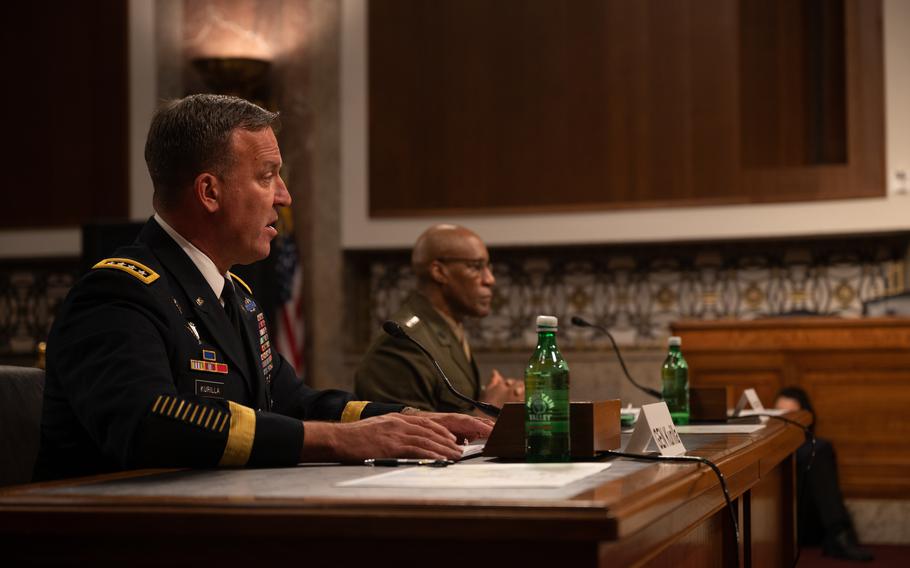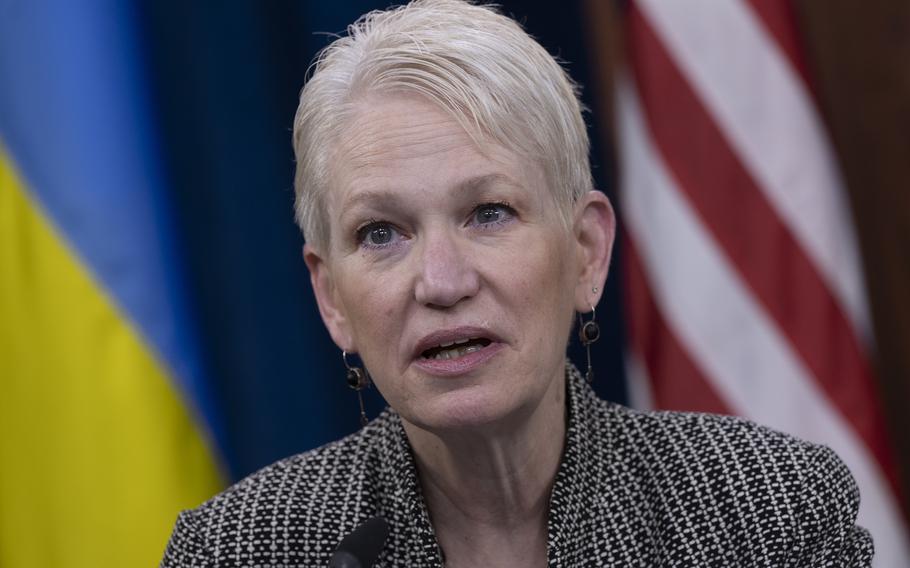
Army Gen. Michael Kurilla, who leads U.S. Central Command, and Marine Corps Gen. Michael Langley, who leads U.S. Africa Command, provide testimony March 16, 2023, at a Senate Armed Services Committee hearing at the Dirksen Senate Office Building in Washington. (John Wright/Department of Defense)
WASHINGTON — China drawing other countries into “shady” new partnerships and the rise of terrorist groups are two of the top U.S. security concerns emerging in the Middle East and Africa, military commanders told lawmakers on Thursday.
Army Gen. Erik Kurilla, who leads U.S. Central Command, and Marine Corps Gen. Michael Langley, who leads U.S. Africa Command, presented their concerns to members of the House Armed Services Committee during a hearing on Capitol Hill about national security.
The generals, along with Celeste Wallander, assistant secretary of defense for international security affairs, said there’s no doubt China is seeking to expand its influence in both regions.
“The People’s Republic of China aggressively expands its informational, military and economic instruments of national power across the region, and now Beijing seeks to establish its diplomatic influence,” Kurilla said, noting China gets half its imported crude oil from the Middle East. “We are now seeing, really, for the first time [China’s] diplomatic instrument of national power” in the region.
U.S.-Chinese relations have been souring for years and took another hit last month when Beijing floated a high-altitude surveillance balloon across the United States before it was shot down over the Atlantic Ocean by a U.S. fighter jet. Federal agents are still going through wreckage looking for clues to explain its purpose.
Langley told lawmakers that China is becoming more influential in Africa and is preying on security-vulnerable countries with “illicit activities” and “shady deals.”
“There are some ill intentions,” he said. “Some of the [Chinese investments], on the face of it, may serve their purposes. But in the end, through the financing realm, it can have some ill effects on [African] society.”
“Our partners have real security needs,” Kurilla added. “And what China is doing is very quickly filling that.”

Celeste Wallander, assistant secretary of defense for international security affairs, speaks to allied ministers and chiefs of defense discussing the war in Ukraine during the fourth Ukraine Defense Contact Group in July 2022. (Chad J. McNeeley/Department of Defense)
Wallander said she’s concerned about the budding relationship between Chinese President Xi Jinping and Russian President Vladimir Putin, who met for three days in Moscow this week to strengthen their cooperation. The ripple effects of their relationship will surely affect the Mideast and Africa, she said.
“That’s the real challenge we have going forward,” Wallander said. “That they share an interest in undermining global security and the rules-based international order, and use one another to advance their national goals.”
“Everything China does is for its own self-interest, and they view partners in the region through a lens of ‘customer’ or ‘client,’” Kurilla added.
The group repeatedly stressed a similar level of concern for the emergence of militant and terrorist factions in places such as Afghanistan, Somalia and Syria, as well as Iran’s interest in nuclear weapons and destabilizing Western-aligned nations such as Israel.
Kurilla said American forces in the Middle East have come under attack 78 times since January 2021 by Iranian drones and rockets fired by Iran proxies.
"The Iran of today is exponentially more militarily capable than it was even five years ago,” he said. “It has the largest and most diverse missile arsenal in the Middle East, and the largest and most capable [drone] force."
Iran has resumed steps toward nuclear weapons since former President Donald Trump abandoned the 2015 agreement that thawed financial sanctions against Tehran in exchange for the country abandoning its nuclear weapons program. The pact included U.N. inspections to confirm Iran was holding up its end of the bargain.
President Joe Biden has said he’ll put the U.S. back in the deal, known formally as the Joint Comprehensive Plan of Action, but talks to do so have largely stalled.
In recent months, the government in Tehran has drawn widespread criticism and spurred mass protests over the death of Mahsa Amini last year by Iran’s “morality police” for not wearing a required hijab. But while many Iranians are pushing back against the government, Kurilla said he doesn’t feel it will lead to regime change.
“The regime can deal with the domestic situation,” he said. “It is my assessment right now that even though the protests have put stress on the regime, it does not put the regime at risk.”
Some Republicans on the committee voiced concern about the return of Taliban control in Afghanistan. Kurilla said while the Taliban is running the government, he doubts its ability to mount large-scale attacks — partly because it’s involved in a fight with its rival Islamic State-Khorasan, or ISIS-K. It was two coordinated ISIS-K attacks that killed 13 U.S. troops during the American evacuation of Afghanistan in August 2021.
During a Senate hearing last week, Kurilla estimated ISIS-K could be poised to launch attacks against U.S. and Western interests in the Middle East in six months. On Thursday, he told House lawmakers that the terrorist group is certainly stronger than it was a year ago.
The defense officials also pointed to possible threats in both regions from the Wagner Group, a private Russian paramilitary force that’s gained notoriety for attacking troops and civilians in Ukraine.
“Wagner has ill intentions. They are destabilizing activity. They have a history of it [in Africa],” Langley said, adding the group has been active in Libya and participated in a recent coup in Mali. “I am concerned about that.”
“It’s all about power for profit,” he added, noting the Russian group is exploiting valuable minerals, gold and diamonds in Africa to finance operations elsewhere.
“Wagner brings not security and stability for [African] countries, but in fact [it is] an entry point for economic exploitation, for instability, extraordinary and horrifying assaults on civilians,” Wallander said. “Because what Wagner offers is regime security, not national security to these countries.”